Riverbend Vineyard
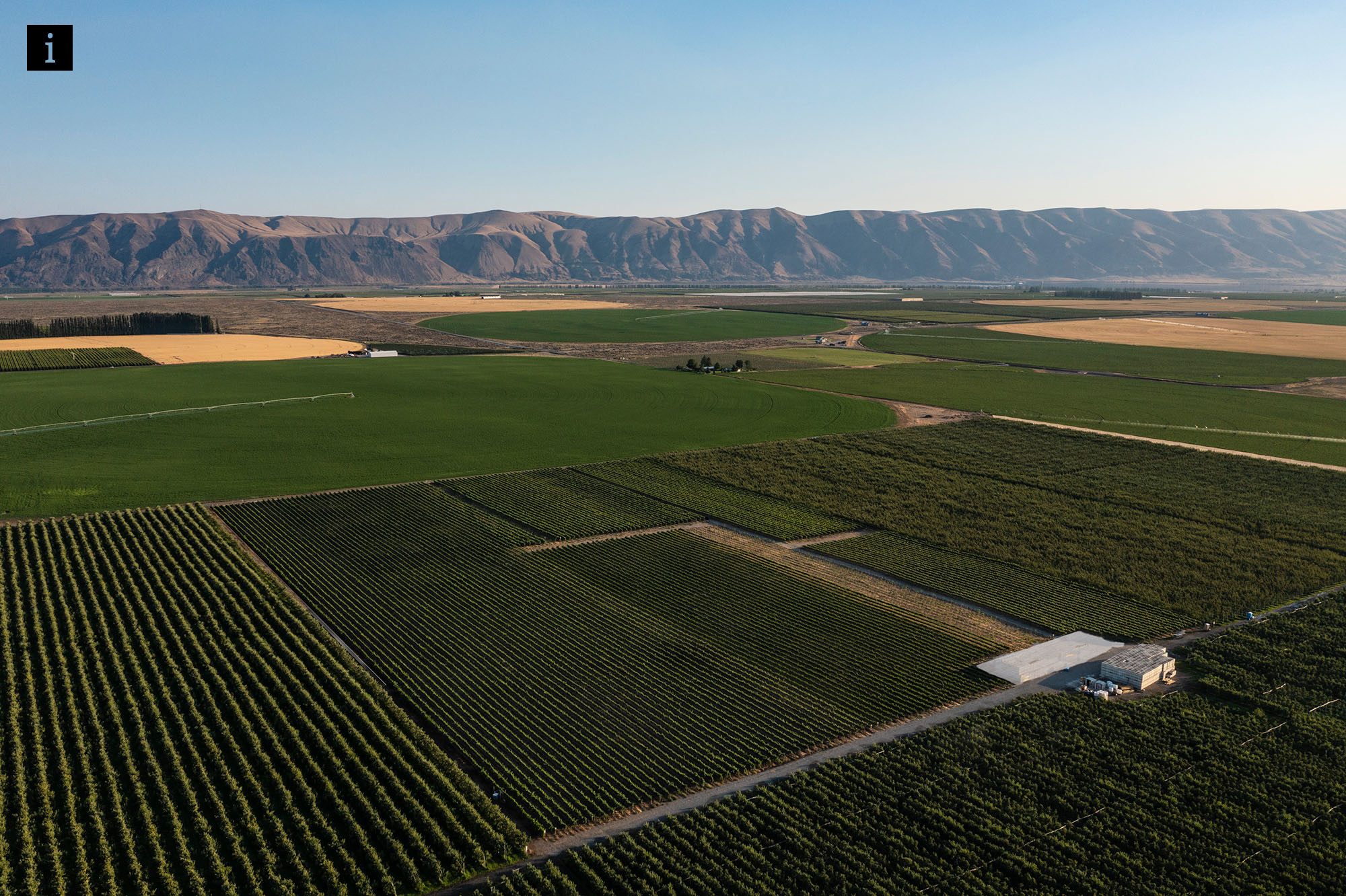
Malbec – 1.0 acres
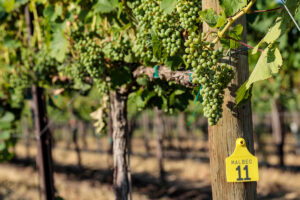
Malbec - 1.0 acres
Planted in 2011 | Clone 04 | 6'x8'
The Malbec block at Riverbend Vineyard is situated centrally between the East and West Blocks of Syrah. It was planted in 2011. Malbec grapes benefit from the large diurnal temperature shifts (cold nights and sunny days) in Eastern Washington, specifically along the Columbia River. In Washington State, roughly 2,500 tons of Malbec are harvested each year (the majority coming from either Wahluke Slope or Horse Heaven Hills). Typically, our Malbec is harvested toward the midseason - after Merlot and before Cabernet.
Malbec's origin is French, specifically from Cahors, where it is commonly called "Côt". Today, roughly 70% of Malbec vineyards call Argentina home. There is a bit of lore associated with how Malbec became a dominant South American varietal. Most attribute the decrease in French acreage to a Phylloxera epidemic that wiped out a significant portions of French plantings.
Purchase wines from this block:
2019 Estate Malbec - click here
2020 Estate Malbec - click here
Cabernet Franc – 1.3 acres
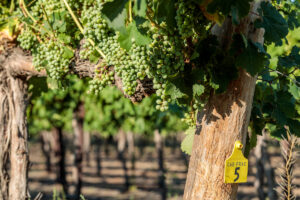
Cabernet Franc - 1.3 acres
Planted in 2001 | Clone 01 | 6' x 8
Cabernet Franc is the parent grape of both Merlot and Cabernet Sauvignon. It's typically a higher acidity wine, which makes it a great wine for BBQ or tomato-based dishes. Cabernet Franc’s origins likely lie in the Basque region of France. In Washington State, roughly 2,500 tons of Cabernet Franc are harvested per year.
The soil profile on the Wahluke Slope is a thin layer of loamy fine sand on top of a deep layer of gravelly glacial outwash. The resulting wines are deeply concentrated and complex. Our Riverbend Vineyard Cabernet Franc shows this concentration and complexity well into the finish.
Purchase wines from this block:
2019 Estate Cabernet Franc - click here
2020 Estate Cabernet Franc - click here
Cabernet Franc - Riverbend Rosé - 0.36 acres

Cabernet Franc - Riverbend Rosé - 0.36 acres
Planted in 2001 | Clone 01 | 6' x 8'
5 rows planted in 2001 transitioned to create an intentional Rosé in 2016. The term "intentional Rosé" refers to grapes grown and harvested to explicitly make Rosé wine. Fielding Hills Winery has produced this dry and crisp Chinon-style Cabernet Franc Rosé since 2014, however, it wasn't until our 2016 Estate Riverbend Rosé that we designated and farmed these 5 rows explicitly to produce a Rosé. At Riverbend, this means allowing more fruit per vine, an early harvest to preserve the grape’s vibrant acidity and bright fruit flavors, followed by a limited maceration.
We chose to produce a Rosé from Cabernet Franc because of the grape's robust, fruit forward acidity and complexity. The resulting wine is refreshing with flavors ranging from ripe strawberry, cherry hard candy, to fresh peach.
Syrah (West Block) - 2.6 acres
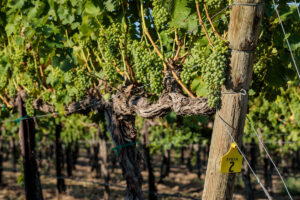
Syrah (West Block) - 2.6 acres
Planted in 2001 | Clone JP | 6'x8'
Syrah originated in the Rhône Valley of France, it's a rich and powerful grape with medium-high tannins and acidity. With notes of blueberry, black plum, tobacco, and chocolate, this grape is extremely food friendly.
The long, hot summer days of Eastern Washington coupled with the massive temperature shifts at night make for ideal growing conditions at Riverbend Vineyard. Adding in the loamy soils and the resulting wines have complex flavors and maintained fruit acidity. Washington State as a whole harvests around 18,000 tons per year of Syrah with the majority being harvested in Horse Heaven Hills, Yakima Valley and the Wahluke Slope.
Purchase wines from this block:
2018 Estate Syrah - click here
2019 Estate Syrah - click here
2019 Estate Tribute - click here
2020 Estate Syrah - click here
2020 Estate Black Label - click here
2020 Estate Tribute - click here
Syrah (East Block) - 1.7 acres
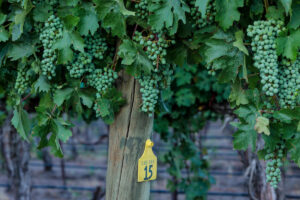
Syrah (East Block) - 1.7 acres
Planted in 2001 | Clone JP | 6'x8'
Syrah originated in the Rhône Valley of France, it's a rich and powerful grape with medium-high tannins and acidity. With notes of blueberry, black plum, tobacco, and chocolate, this grape is extremely food friendly.
The long, hot summer days of Eastern Washington coupled with the massive temperature shifts at night make for ideal growing conditions at Riverbend Vineyard. Adding in the loamy soils and the resulting wines have complex flavors and maintained fruit acidity. Washington State as a whole harvests around 18,000 tons per year of Syrah with the majority being harvested in Horse Heaven Hills, Yakima Valley and the Wahluke Slope.
Purchase wines from this block:
2018 Estate Syrah - click here
2019 Estate Syrah - click here
2019 Estate Tribute - click here
2020 Estate Syrah - click here
2020 Estate Black Label - click here
2020 Estate Tribute - click here
Carménère - 0.4 acres
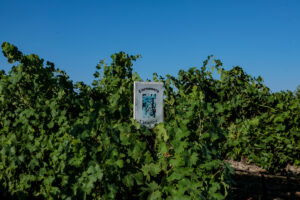
Carménère - 0.4 acres
Planted in 2011 & 2020 | Clone VCR 702 | 6'x8'
Carménère originated from the Bordeaux region of France. However, due to a phylloxera infestation, nearly all the Carménère vines – along with most of the vineyards in Bordeaux – were wiped out. Carménère was thought to be on the verge of extinction. Carménère was first brought to Chile in the mid 1800s and was thought to be Merlot until 1994. In 1998, Chile officially recognized Carménère as a distinct variety.
Carménère benefits from sandy soils, common in the Wahluke Slope. The overall production of a Carménère vine is typically quite low, which in turn results in a higher concentration of flavor and quality of the grapes.
Purchase wines from this block:
2020 Estate Carménère - click here
Cabernet Sauvignon (South Block) - 4.0 acres

Cabernet Sauvignon (South Block) - 4.0 acres
Planted in 1998 | Clone 08 | 6'x8'
By far the world's most popular red wine grape, Cabernet Sauvignon is a natural cross between Cabernet Franc and Sauvignon Blanc from the Bordeaux region in France. When we first chose to plant wine grapes, Cabernet was a natural front-runner because of its high concentration of fruit flavors and age worthiness. In 1998, when Riverbend was planted, there was an estimated 71,000 tons of wine grapes harvested throughout the entire state. As of 2020, there are between 200,000 and 170,000 tons harvested per year and ~52,000 tons of that are Cabernet Sauvignon.
Cabernet Sauvignon performs well in gravelly, loamy soils. The Wahluke Slope AVA uniformly features 5+ feet of glacial outwash from the Missoula Floods, making the region a premier location for Cabernet Sauvignon vines.
Purchase wines from this block:
2018 Estate Cabernet Sauvignon - click here
2019 Estate Cabernet Sauvignon - click here
2020 Estate Cabernet Sauvignon - click here
2020 Estate Black Label - click here
2020 Estate Tribute - click here
Tempranillo - 0.33 acres
Tempranillo - 0.33 acres
Planted in 2020. The number 1 red wine grape of Spain, we planted a small test block of Tempranillo because of its versatility as a blending grape and because of its bold, red fruit flavors as a standalone varietal. The resulting wines are typically medium-full bodied with strong acidity and tannins. Tempranillo will benefit from the arid desert climate at Riverbend Vineyard as the grape grows well in dry, hot conditions.
Petit Verdot - 0.33 acres
Petit Verdot - 0.33 acres
Planted in 2020. Petit Verdot (translates closely to "little green one") is a full-bodied red wine grape that originates in southwestern France (in Bordeaux) but is common in Spain, Australia, California, and Washington. We chose to plant a test block of the varietal because it is commonly used as a blending grape, offering color and complexity, as well as a single varietal. Thus, giving us a range of potential applications. Aromas of this wine are typically that of black fruits such as plum or dark cherry leading to a high tannin, bold fruit flavor.
Barbera - 0.33 acres
Barbera - 0.33 acres
Planted in 2020. Barbera originated in the Piemonte region of northern Italy and was first be see in the United States in the 1880s. It's a food-friendly wine with generous acid structure and smooth tannins. Barbera located near the Columbia River benefits year-round from the climate-moderating effects of the Columbia River, and the mixing of arid desert air (from the east) and marine air (from the west).
We planted a test block of Barbera because the wine's dark pigment and heavy berry flavor add great complexity and texture when blending, while also remaining a bright and round standalone varietal.
Cabernet Sauvignon (North Block) - 4.2 acres
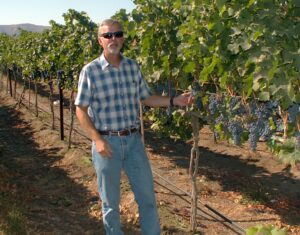
Cabernet Sauvignon (North Block) - 4.2 acres
Planted in 1998 | Clone 08 | 6'x8'
By far the world's most popular red wine grape, Cabernet Sauvignon is a natural cross between Cabernet Franc and Sauvignon Blanc from the Bordeaux region in France. When we first chose to plant wine grapes, Cabernet was a natural front-runner because of its high concentration of fruit flavors and age worthiness. In 1998, when Riverbend was planted, there was an estimated 71,000 tons of wine grapes harvested throughout the entire state. As of 2020, there are between 200,000 and 170,000 tons harvested per year and ~52,000 tons of that are Cabernet Sauvignon.
Cabernet Sauvignon performs well in gravelly, loamy soils. The Wahluke Slope AVA uniformly features 5+ feet of glacial outwash from the Missoula Floods, making the region a premier location for Cabernet Sauvignon vines.
The above picture is Mike in the early 2000s, inspecting the vines before harvest.
Purchase wines from this block:
2018 Estate Cabernet Sauvignon - click here
2019 Estate Cabernet Sauvignon - click here
2019 Estate Tribute - click here
2020 Estate Cabernet Sauvignon - click here
2020 Estate Black Label - click here
2020 Estate Tribute - click here
Merlot - 3.8 acres
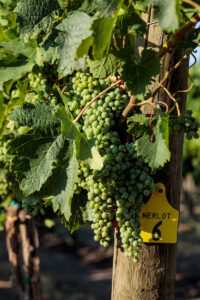
Merlot - 3.8 acres
Planted in 1998 | Clone 03 | 6'x8'
Merlot is a child grape of Cabernet Franc and a sibling of Cabernet Sauvigon, originally from the Bordeaux region of France and dating back to the first century AD. When we planted Riverbend Vineyard, Merlot was the most common red wine variety in Washington State. Today, Merlot is a distant second to Cabernet with roughly 22,000 tons harvested each year with the majority coming from the Yakima Valley, Horse Heaven Hills, and Wahluke Slope.
Merlot from Riverbend Vineyard benefits from the well-drained loamy fine sand of the Wahluke Slope. The resulting wine is deep ruby in color with dark fruit flavors and a full body.
Purchase wines from this block:
2019 Estate Merlot - click here
2019 Estate Tribute - click here
2020 Estate Merlot - click here
2020 Estate Tribute - click here
Cabernet Franc - 1.0 acres

Cabernet Franc - 1.0 acres
Planted in 2021. Cabernet Franc is the parent grape of both Merlot and Cabernet Sauvignon. It's typically a higher acidity wine, which makes it a great wine for BBQ or tomato-based dishes. Cabernet Franc’s origins likely lie in the Basque region of France. In Washington State, roughly 2,500 tons of Cabernet Franc are harvested per year.
The soil profile on the Wahluke Slope is a thin layer of loamy fine sand on top of a deep layer of gravelly glacial outwash. The resulting wines are deeply concentrated and complex. Our Riverbend Vineyard Cabernet Franc shows this concentration and complexity well into the finish.
Purchase wines from this block:
2019 Estate Cabernet Franc - click here
2020 Estate Cabernet Franc - click here
Riverbend Vineyard
Riverbend Vineyard
Appellation: Wahluke Slope
Elevation: 780-800ft
Slope: 0-5%
Aspect: Gentle South Facing
Soil: Burbank Loamy Fine Sand
Total Planted Acres: 22.5
Varietals: Cab Sauv (08), Merlot (03), Cab Franc (01), Malbec (04), Carménère (VCR702), Syrah (JP/16), Barbera, Tempranillo, Petit Verdot
Years Planted:
1998 - 5 acres CS, 5 acres ME
2000 - 4 acres CS, 1.5 acres S
2001 - 3 acres S, 2 acres CF
2010 - 1 acres Malbec
2011 - 0.2 acres Carménère
2020 - 0.2 acres Carménère
2020 - 0.33 acres Barbera, 0.33 acres Tempranillo, 0.33 acres Petit Verdot
Farmed: Conventionally
Trellising: Bilateral Cordon VSP
Vine Spacing: 6x8ft